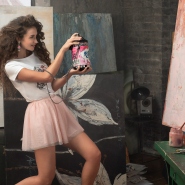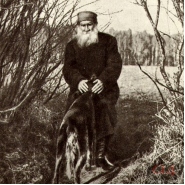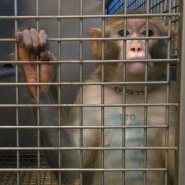"— When it became no longer necessary to kill for food, the humankind took the last step from necessity to the true human freedom. It was impossible until we learned how to cultivate animal protein from vegetable ones. Instead of cows, we have an artificial milk and meat factory, —explained Grif Rift.
— Why don’t we have it yet? — the Tormancians used to ask. — It looks like your biology was engaged in something else, or was misleading, or was confined by other sciences that were less important for the humankind prosperity. The situation known in the terrestrial history…
— And you arrived at the conclusion that you can’t achieve the true cultural height if you continue killing animals for food?
— Yes!
— But we need animals for scientific experiments as well.
— No! Look for alternative routes, but stop these tortures. The world is incredibly complex, and you will surely find many other ways to discover the truth."
Ivan Efremov “The bull’s hour”.

In the book written more than 50 years ago, a writer, scientist and humanist Ivan Efremov says that a perfect and prosperous world will only be possible when people realize that they must stop torturing and killing innocent creatures.
The contemporary science has solved the problem of artificial meat cultivation. But unfortunately, under the conditions of competition and tough capitalism, the humans’ main value is money instead of humanism. Everything has its financial value, including the life of living beings and nature. The technology of cultivating meat in a testing tube was already developed in 2001, and was patented by Dutch scientists and entrepreneurs. However, due to the high economic costs that existed at that time, it wasn’t productionized.

How to grow meat in Petri dish.
Below, I will briefly describe the artificial meat cultivation technology.
1. It all starts with taking an animal’s stem cells; these are the cells capable of reproducing themselves quickly.

2. Proteins promoting tissue growth are added to the cells. Then, they are placed in a bioreactor mixing the culture medium during the microbiological synthesis process. The bioreactor supplies cells with oxygen and nutrition, as well as removes the biological body wastes, thus creating all the conditions required for muscle tissue development.

3. To make the artificial meat taste like the meat of a living creature, laboratories use so-called “scaffolds” that stretch the developing muscle tissue, simulating movements made by a real body. Scientists claim that after two months of cultivation, they can get 50,000 tons of artificial meat from 10 cells. It sounds encouraging!

However, there a few problems to be solved.
1. Tastiness. Scientists are to make the artificially cultivated meat that tastes no worse than the meat of an animal that grew up in the nature. Russian scientists managed to achieve 50% of taste similarity. In 2013, the first In Vitro meat burger was made in London. It took 20,000 thin strips of muscle tissue to make it, with its cost amounting to $325,000. After tasting the burger, cooking expert Hanni Rutzler arrived at the following conclusions:
“Its taste is extremely strong. It contains no fat, and it is not as juicy as I would like it to be. But this product is closer to meat than to the soy copy”.
2. Use of preservatives. To protect the cultivated meat from fungus, laboratories use chemical nonorganic preservatives such as sodium benzoate. However, I think that this problem can be solved by using natural organic antibacterial agents and antibiotics. For example, some herbal extracts or propolis can successfully combat fungal cells.
3. High cost of cultivating meat in a testing tube. In 2008, it cost $1 million to get a piece of meat weighing 250 grams. Russian scientists are also involved in researching the cultivation of meat in Petri dish. But the problem of high production cost hasn’t been solved up to now: to cultivate 40 grams of experimental ethical meat, Russian entrepreneur Alexander Savkov spent about 13 thousand dollars.

PETA – an organization protecting animal rights – is investing millions of dollars in developing the artificial meat cultivation technology that would require lower expenditure. And nowadays, some scientists claim that they have managed to find a solution to this problem.
By 2019, scientists managed to reduce the production cost to $ 11 per 1 kilo (although some laboratories still estimate their production at $1000-2000 per 1 kilo).
An American company JUST (former Hampton Creek company) is now engaged in experiments with Fois Gras (an overfed goose or duck liver). JUST Inc. promises that it will soon begin supplying American restaurants with Fois Gras created without any violence and murders.
Memphis Meats company from California announced that a factory producing the artificial meat is going to be built in the United States. Soo, it will become real to give up violence and murdering animals.
I do really hope that the humankind on the whole planet will become more humane and will give up performing blood sacrifice for the sake of satisfying their stomachs. After all, now we have a new alternative!

 TRENDS, COLLECTIONS & BRANDS
TRENDS, COLLECTIONS & BRANDS
 VEGAN LIFESTYLE
VEGAN LIFESTYLE
 ALL ABOUT ANIMALS
ALL ABOUT ANIMALS


 English
English
 Русский
Русский
 Español
Español
 Français
Français












